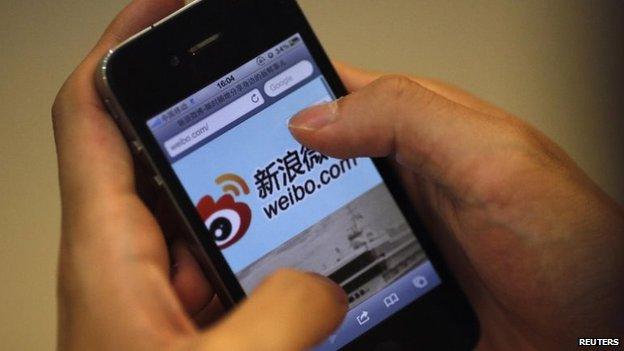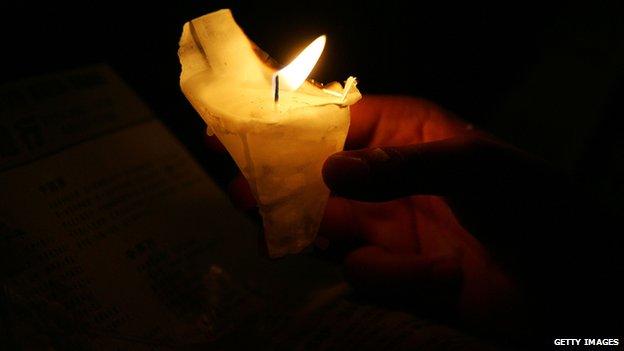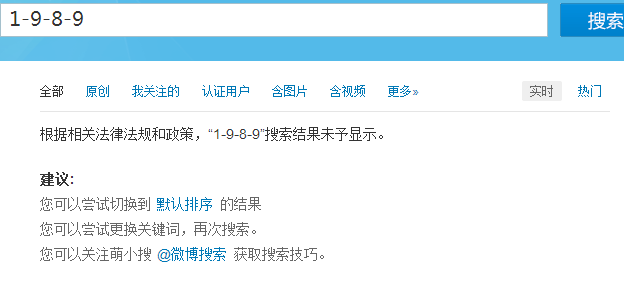Struggle to mark Tiananmen on China's social media
- Published

Censorship efforts have been stepped up on the 25th anniversary of the Tiananmen Square protests
China's heightened security amid the 25th anniversary of the Tiananmen Square crackdown has also extended to much of its internet and social media, as many online users attempt to evade the censors to commemorate the event.
On Sina Weibo, China's largest microblogging platform, the search function for several phrases related to the massacre have been blocked, external, including "Tiananmen" "six four" and "tank".
More seemingly innocuous terms, such as "candlelight" and "today", have also been blocked.
Users putting in those terms are shown a message that reads: "The search terms are not displayed, in accordance with the relevant laws and regulations."
According to Chinese state media, there are more than two million people hired to monitor internet activity in China.
However, China's popular message app Weixin appears to have escaped censorship, with users able to post photos and messages related to the anniversary.
Weibo censorship increased
Many users on China's microblogs are accustomed to finding creative ways to bypass the monitors.
In previous years, workarounds have included a photo of rubber ducks taking the place of tanks on Tiananmen Square, external, a Lego recreation of the famous scene where a man blocked a line of tanks on the square, and a photo of playing cards on Tiananmen Square, external, showing the numbers "8-9-6-4".
However, censorship efforts appear to have been stepped up this year, with fewer pictures seen referring to the crackdown online.
The phrase "May 35" has previously been used to refer to the crackdown, given the blocking of the term "June 4". However, "May 35" was also banned this year.

Users often use images of candles to commemorate the massacre
One user, who did not wish to be identified, told the BBC that the candle emoticon was missing from the usual emoticons available on Sina Weibo, and the word "candle" was blocked.
"I saw more content on 4 June last year - but there seems to be much less online this year," he said.
Charlie Smith, co-founder of Free Weibo, an uncensored version of Sina Weibo, told the BBC: "Some photos are making it through but not many. It saddens me to say that the censors can likely claim victory today, at least around this event."
Pictures of rubber ducks and odd number combinations all seemed to be blocked successfully, he added.
'1-9-8-9'
Nonetheless, some users have managed to commemorate the event with oblique references and images.
Many began writing "1-9-8-9" in an attempt to avoid being blocked - although the censors eventually caught up.
Xiao Chen, a poet, shared a photo of students at a university, external in Beijing, with the words: "1-9-8-9 May, Beijing. A university dormitory."
The reference was picked up by other users, with one commenting "that was an era that was quickly forgotten", and another writing: "25 years have past".

The search term 1-9-8-9 was eventually blocked on Sina Weibo on Wednesday
One user changed his profile picture to an image of a candle.
Another user outside China posted a link to an interview about the crackdown, with the hashtag #The day of Amnesia#.
One man used a tongue-in-cheek reference to the censors to mark the day.
"It's that time of year again when certain numbers become illegal," he wrote, sharing a photo, external of the phrase "25 years" being blocked on his Weibo account.
Meanwhile, the Canadian embassy in Beijing also made its own reference to the crackdown.
The consulate's official Sina Weibo account posted a picture of the ambassador and his wife, external on a cycling tour near the Chairman Mao Memorial Hall - which is located on Tiananmen Square.
"The visit let them remember various past events about the square, including those years when the square had a more relaxed, amicable atmosphere."
Additional interviews conducted by the BBC's Lorna Hankin